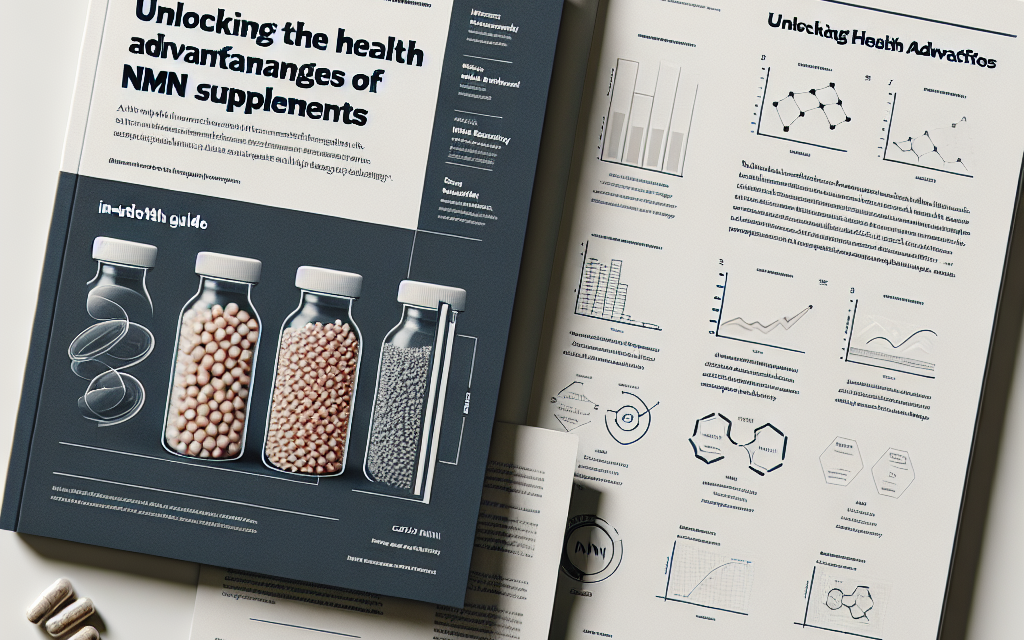Unlocking the Health Advantages of NMN Supplements: An In-Depth Guide
Nicotinamide mononucleotide (NMN) has emerged as a popular supplement in the realm of health and wellness, particularly for its potential anti-aging properties. As research continues to unveil the myriad benefits of NMN, individuals are increasingly interested in how this compound can enhance their health. This article delves into the health advantages of NMN supplements, exploring their mechanisms, benefits, and the science behind them.
1. Understanding NMN: The Science Behind the Supplement
To appreciate the health advantages of NMN, it is essential to understand what NMN is and how it functions within the body. NMN is a nucleotide derived from ribose and nicotinamide, and it plays a crucial role in the production of nicotinamide adenine dinucleotide (NAD+), a coenzyme found in every living cell.
NAD+ is vital for various biological processes, including:
- Energy metabolism
- DNA repair
- Cellular signaling
- Regulation of circadian rhythms
As we age, NAD+ levels decline, which can lead to various age-related health issues. This decline has prompted researchers to explore NMN as a potential supplement to boost NAD+ levels and mitigate the effects of aging.
Studies have shown that NMN supplementation can effectively increase NAD+ levels in various organisms, including mice and humans. For instance, a study published in the journal “Cell Metabolism” demonstrated that NMN administration in mice improved their energy metabolism and physical activity levels, suggesting that NMN could have similar effects in humans.
2. The Anti-Aging Potential of NMN
One of the most compelling reasons individuals turn to NMN supplements is their potential anti-aging effects. Research indicates that NMN may help combat the biological processes associated with aging.
Key areas where NMN may exert anti-aging effects include:
- Improved Mitochondrial Function: Mitochondria are the powerhouses of cells, responsible for producing energy. As we age, mitochondrial function declines, leading to decreased energy levels and increased fatigue. NMN supplementation has been shown to enhance mitochondrial function, thereby improving energy production.
- Enhanced DNA Repair: DNA damage accumulates over time, contributing to aging and age-related diseases. NMN may promote the activity of enzymes involved in DNA repair, helping to maintain genomic integrity.
- Increased Insulin Sensitivity: Aging is often associated with insulin resistance, which can lead to metabolic disorders. NMN has been shown to improve insulin sensitivity in animal models, suggesting it may help mitigate age-related metabolic decline.
- Reduction of Inflammation: Chronic inflammation is a hallmark of aging. NMN may help reduce inflammation by modulating immune responses, potentially lowering the risk of age-related diseases.
In a landmark study published in “Nature,” researchers found that NMN supplementation in aged mice led to improved physical performance, enhanced energy metabolism, and increased lifespan. These findings have sparked interest in human trials to determine the efficacy of NMN in promoting longevity.
3. NMN and Cardiovascular Health
Cardiovascular diseases remain a leading cause of mortality worldwide, making heart health a critical area of focus for researchers. NMN has shown promise in supporting cardiovascular health through various mechanisms.
Research indicates that NMN may benefit cardiovascular health by:
- Improving Endothelial Function: The endothelium is a thin layer of cells lining blood vessels, playing a crucial role in vascular health. NMN supplementation has been shown to enhance endothelial function, which is vital for maintaining healthy blood flow and preventing atherosclerosis.
- Reducing Oxidative Stress: Oxidative stress contributes to cardiovascular diseases by damaging blood vessels and promoting inflammation. NMN may help reduce oxidative stress by increasing NAD+ levels, which in turn enhances the activity of antioxidant enzymes.
- Regulating Blood Pressure: High blood pressure is a significant risk factor for heart disease. Some studies suggest that NMN may help regulate blood pressure by improving vascular function and reducing arterial stiffness.
A study published in “Circulation Research” found that NMN supplementation improved vascular function in aged mice, leading to better blood flow and reduced arterial stiffness. These findings suggest that NMN could be a valuable supplement for promoting cardiovascular health in aging populations.
4. NMN and Cognitive Function
Cognitive decline is a common concern as individuals age, with conditions such as Alzheimer’s disease and other forms of dementia becoming increasingly prevalent. NMN has garnered attention for its potential neuroprotective effects and ability to enhance cognitive function.
Key mechanisms through which NMN may support cognitive health include:
- Enhancing Neuroplasticity: Neuroplasticity refers to the brain’s ability to adapt and reorganize itself. NMN may promote neuroplasticity by increasing NAD+ levels, which are essential for neuronal health and function.
- Reducing Neuroinflammation: Chronic inflammation in the brain is linked to cognitive decline. NMN may help mitigate neuroinflammation by modulating immune responses and promoting the health of glial cells, which support neurons.
- Improving Blood Flow to the Brain: Adequate blood flow is crucial for optimal brain function. NMN’s potential to enhance endothelial function may also benefit cerebral circulation, ensuring that the brain receives sufficient oxygen and nutrients.
A study published in “Nature Communications” demonstrated that NMN supplementation improved cognitive function in aged mice, leading to enhanced learning and memory capabilities. These findings highlight the potential of NMN as a cognitive enhancer, particularly for older adults.
5. Safety and Dosage Considerations for NMN Supplements
As with any supplement, safety and appropriate dosage are critical considerations for individuals interested in NMN. While NMN is generally considered safe, it is essential to understand potential side effects and recommended dosages.
Current research suggests that NMN is well-tolerated in humans, with few reported side effects. Some individuals may experience mild gastrointestinal discomfort, but these effects are typically transient. Long-term safety studies are still needed to fully understand the implications of prolonged NMN supplementation.
Recommended dosages of NMN vary based on individual health goals and conditions. Most studies have used dosages ranging from 250 mg to 500 mg per day. However, it is advisable for individuals to consult with healthcare professionals before starting any new supplement regimen, especially those with pre-existing health conditions or those taking medications.
In conclusion, NMN supplements offer a promising avenue for enhancing health and longevity. With their potential anti-aging effects, cardiovascular benefits, cognitive enhancements, and overall safety profile, NMN is gaining traction as a valuable addition to health and wellness routines. As research continues to unfold, individuals can look forward to a deeper understanding of how NMN can unlock health advantages and improve quality of life.
Conclusion
In summary, NMN supplements present a compelling option for those seeking to enhance their health and combat the effects of aging. From improving mitochondrial function and cardiovascular health to supporting cognitive function and reducing inflammation, the potential benefits of NMN are vast and varied. As research progresses, it is crucial for individuals to stay informed about the latest findings and consult healthcare professionals when considering NMN supplementation.
Ultimately, NMN represents a fascinating intersection of science and wellness, offering hope for a healthier, more vibrant future as we age. By unlocking the health advantages of NMN, individuals may take proactive steps toward enhancing their overall well-being and longevity.





